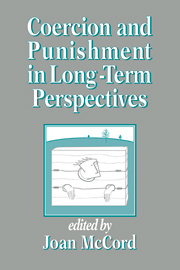Book contents
- Frontmatter
- Contents
- List of contributors
- Acknowledgments
- 1 Introduction: coercion and punishment in the fabric of social relations
- I Mental health, coercion, and punishment
- 2 Relationships as context: supportive and coercive interactions in competent, aggressive, and anxious mother–child dyads
- 3 Parental hostility, childhood behavior, and adult social functioning
- 4 Corporal punishment of children and adult depression and suicidal ideation
- II Family socialization practices and antisocial behavior
- III Aggression and coercion in the schools
- IV Deviance, crime, and discipline
- V Measuring and predicting in studies of coercion and punishment
- Name index
- Subject index
2 - Relationships as context: supportive and coercive interactions in competent, aggressive, and anxious mother–child dyads
Published online by Cambridge University Press: 29 September 2009
- Frontmatter
- Contents
- List of contributors
- Acknowledgments
- 1 Introduction: coercion and punishment in the fabric of social relations
- I Mental health, coercion, and punishment
- 2 Relationships as context: supportive and coercive interactions in competent, aggressive, and anxious mother–child dyads
- 3 Parental hostility, childhood behavior, and adult social functioning
- 4 Corporal punishment of children and adult depression and suicidal ideation
- II Family socialization practices and antisocial behavior
- III Aggression and coercion in the schools
- IV Deviance, crime, and discipline
- V Measuring and predicting in studies of coercion and punishment
- Name index
- Subject index
Summary
In 1622 William Gouge published an early treatise on education written in English. In it he warned parents about the many “vices” of children, of which one is “stubbornnesse, when children pout, swell, and give no answer at all to their parents. This is too common a fault in children, and many parents are much offended and grieved thereat” (p. 248).
It obviously did not take social scientists to discover that oppositional, defiant, or otherwise coercive behaviors can be a major source of stress for parents of young children. Descriptive studies of family interactions have shown that mothers commonly attempt to manage their preschoolers by commanding or disapproving once every 3 to 4 minutes and that instances of child noncompliance or defiance, which are very common at that age, tend to elicit more parental attention than instances of positive behavior (Forehand, King, Peed, & Yoder, 1975; Johnson, Wahl, Martin, & Johansson, 1973). Clinical and laboratory evidence suggests that such increases in attention are commonly associated with corresponding increases in both aversive and indiscriminate responding on the part of parents and play a key role in differentiating between functional and dysfunctional family interactions (e.g., Dumas & Wahler, 1985; Patterson, 1982; Sawin & Parke, 1979; Snyder, 1977).
Information
- Type
- Chapter
- Information
- Coercion and Punishment in Long-Term Perspectives , pp. 9 - 33Publisher: Cambridge University PressPrint publication year: 1995
Accessibility standard: Unknown
Why this information is here
This section outlines the accessibility features of this content - including support for screen readers, full keyboard navigation and high-contrast display options. This may not be relevant for you.Accessibility Information
- 6
- Cited by
